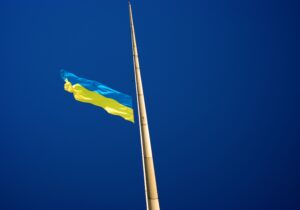After invading Ukraine without cause, Vladimir Putin’s army is now targeting civilians—apartments, hospitals, schools, religious sites—without remorse or moral constraint. Governments worldwide have responded with heavy economic counterstrikes against Russia and torrents of weapons shipments into Ukraine. The United Nations General Assembly has overwhelmingly condemned Putin’s criminal war. The United States and its NATO allies are bolstering NATO’s eastern flank. But no nation or group of nations—not the US, not NATO, not the UN—is willing to use military force against Russia to stop this bludgeoning. So, responsible powers must find a way to turn this war off—if not a pathway to peace, then at least a path away from war.
Costs and Dangers
Owing to its sheer mass—military, industrial, demographic, economic—Russia can certainly secure a battlefield victory over Ukraine, albeit a pyrrhic one. But owing to the tenacity of Ukraine, the illegitimate grounds of Putin’s invasion, the beastly tactics of Putin’s invasion force, and the cascade of economic-financial consequences raining down on Moscow, Russia has already lost the war beyond Ukraine.
Putin has catastrophically underestimated his enemies, overestimated his own military, self-sabotaged his geopolitical position, and weakened his country.
In a crippling blow to Russia’s economy, the US, Britain, Canada, European Union, and Japan disconnected Russian banks from the system that enables financial transfers among banks in 200 countries. Much of the Free World has closed its airspace to Russian planes. Russian oligarchs have been cut off from assets and property around the world. Putin’s kleptocracy has been cut off from multibillion partnerships with the likes of BP, Shell, ExxonMobil, and Maersk. Russian citizens have been cut off from much of the world’s goods and services: Ford and Dell have suspended operations in Russia, as have Toyota, Volkswagen, Nissan, Mercedes, and General Motors. Apple suspended sales in and exports to Russia. Netflix has severed connections to Russia. PayPal, MasterCard, and Visa have shut down operations. Intel and Microsoft have halted sales. Disney, Paramount, and Universal suspended movie releases. The NHL, FIFA, WWE, and F1 have cut ties with Russia.
This barrage has sent the Russian ruble crashing, triggered a run on Russia’s banks, shuttered the Russian stock market and made it “un-investable,” forced Putin’s regime to impose emergency anti-hoarding orders, and isolated the Russian populace. Indeed, because of Putin’s savage assault on Ukraine, Russia faces a level of international isolation beyond anything the Soviet Union—with its bloc of satellites and proxies—ever endured.
All of this may be satisfying and well-deserved. But there are costs and dangers in leaving Putin cornered with nothing to lose. That’s not a good place for a person with 4,500 nuclear warheads. Ukraine is bearing some of those costs even now. And with Putin rattling his nuclear saber, the danger of conventional conflict turning into something unconventional and unthinkable increases as the war grinds on.
Even before the Nuclear Age, Sun Tzu cautioned, “When you surround an army, leave an outlet… Do not press a desperate foe too hard.” The reason: An enemy with nothing left to lose is capable of anything.
To prevent wars from spiraling out of control, off-ramps are essential. Put another way, allowing tyrant regimes to save face can save lives, as we saw during the 1962 missile crisis with Moscow and the 2001 Hainan crisis with Beijing
The Wind and the Whirlwind
There are reports circulating that Russia is willing to end combat operations “immediately” if Ukraine agrees to a kind of Finland-style neutrality, acknowledges Crimea as Russian territory, and recognizes Donetsk and Luhansk as independent. The fact that Moscow floated this suggests Russia’s army is hemorrhaging.
Ukraine, the US, and NATO should use these proposals as a starting point for de-escalation and mediation. There appears to be a mediation team already in place: the strange-bedfellow partnership of Israel and the People’s Republic of China.
Beijing obviously has connections—and strings to pull—in Moscow that the West doesn’t have. PRC Foreign Minister Wang Yi this week said Beijing is “willing to work with the international community to carry out necessary mediation.”
Israel, too, is uniquely positioned in this crisis. It is a democratic, Western-oriented nation that Ukraine’s backers broadly trust, and it happens to have extensive military contacts and a working rapport with Russia due to the involvement of both nations in Syria. Israeli Prime Minister Naftali Bennett secretly traveled to Moscow last weekend—with the blessing of Washington, Paris, and Berlin. The fact that Bennett, an Orthodox Jew, made the trip during his Sabbath also served as a signal to many. “Saving lives comes before Shabbat,” as the Jewish faithful declare.
We should hope and pray there’s something at work in these diplomatic moves.
Before the mediators can push toward a settlement, the US and its allies will need to convince Ukraine’s remarkable president, Volodymyr Zelensky, that he’ll have to give away something to hasten an end to Putin’s war.
Washington and its allies, for example, could persuade Zelensky to cede Ukraine’s claims to Crimea—and then recognize Russian control over the peninsula. Such a concession is unpalatable but arguably tolerable because the territory was transferred by Soviet strongman Nikita Khrushchev to Ukraine as a “gift” in 1954, when both Russia and Ukraine were part of the Soviet Union.
In addition, the US could agree to a revamped Intermediate-Range Nuclear Forces (INF) Treaty. (The US withdrew from the treaty in 2019, after years of Russian violations.) This proposal was included in Putin’s December diktat, so he would welcome it—as would America’s Indo-Pacific allies, if Washington makes clear that the new INF Treaty would need to enfold China’s burgeoning missile arsenal.
Finally, the US and its NATO, EU, and Indo-Pacific allies could pledge to phase out sanctions severing Russia from the global financial and banking systems.
All of these would allow Putin to save some amount of face.
What the Free World would not be able to do is promise that individual corporations will return to the Russian market. In this era when businesses are highly sensitive to and responsive to customers’ political sentiment, many corporations will likely steer clear of Russia as long as Putin is in power. As the Atlantic Council’s Anders Aslund observes, “Russia has become toxic. No company that wants to maintain any reputation can trade with, invest in or maintain enterprise in Russia.”
Indeed, it seems unlikely that Russia will be brought in from the cold until Putin is gone. The man who sows the wind often reaps the whirlwind.
Open Reassurance and Quiet Warnings
On the other side of the ledger, the armistice should require all Russian forces to withdraw from all of mainland Ukraine, including Donetsk and Luhansk. This will be a heavy lift for Beijing, but a necessary one. The history of these regions—and what Putin did to seize them—seems markedly different than Crimea.
NATO should reiterate that, in accordance with Article X of the North Atlantic Treaty, the alliance remains open to any nation that meets the criteria for membership. Even so, the alliance could also note that Ukraine may not yet meet those criteria.
To reassure Kyiv and deter Putin from repeating his atrocities, the US could elevate Ukraine to the status of “major non-NATO ally”—a designation Argentina, Bahrain, Egypt, Israel, Jordan, Kuwait, Morocco, Taiwan, and other partners enjoy. This would not tie the US to a mutual-defense treaty, but it would send a strong signal to Kyiv and Moscow. As part of this designation, the US could provide Ukraine access to intelligence, defensive weapons, military exchanges, systems, and practices to move Ukraine toward NATO interoperability, and joint training programs on Ukrainian territory (as was the case before Putin’s invasion).
To further reassure Ukraine, the EU could pledge to fast-track consideration of Ukraine’s membership, which gained momentum after Putin’s invasion. And to reassure NATO’s easternmost members, NATO should make clear that due to Putin’s unprovoked aggression, the alliance will continue to strengthen its defensive posture from the Baltics south to Bulgaria.
A peacekeeping force of Organization for Security and Co-operation in Europe (OSCE) and United Nations personnel could be deployed to monitor the Ukraine-Russia frontier, which Ukraine would welcome. Ensuring that the peacekeeping force would not include any NATO personnel would be welcome news for Moscow, though such a force may be difficult to assemble without NATO’s technical assistance.
Finally, Washington might want to quietly dispatch an emissary who knows the neighborhood—Gen. James Mattis commanded NATO’s Allied Command for Transformation, Secretary Robert Gates was a Soviet expert at the CIA throughout the Cold War, Gen. Phillip Breedlove commanded NATO—to remind one of Putin’s generals that in the span of just two weeks Ukraine has claimed 5,000 Russians killed or captured, more than 100 tanks and dozens of aircraft; that Zelensky has a literal people’s army of citizen-soldiers willing to die for their country and cause; that thousands of foreign volunteers are pouring into Ukraine from America and Europe to fight Russia’s conscript army; that if Putin drives past this off-ramp and tries to occupy a razed Ukraine, dozens of countries are laying the groundwork for a well-funded, highly-coordinated guerilla insurgency; and that America has a very good playbook for such an insurgency. The Soviets lost 15,000 dead and 60,000 wounded during their occupation of Afghanistan.
Invoking this approach may seem incongruent for a publication encompassing faith and foreign policy. But sadly, this is the only language men like Putin understand. As Reinhold Niebuhr observed in the early hours of the Cold War, “We take, and must continue to take, morally hazardous actions to preserve our civilization.”
Broken
The path away from war outlined here is less than satisfying and indeed less than just. If justice ever catches up with Putin this side of eternity, it will likely be delivered by the Russian people or the Russian military.
The hard truth is that there will be no unconditional surrender, no apologies from Putin, no reparations, and nothing close to the sort of peace we desire and Ukraine deserves. We will not know that kind of peace—shalom, peace with harmony and justice—until Christ returns to make all things new. In the interim, in this broken world, oftentimes the best we can do is prevent men like Putin from realizing the sort of peace they desire.







 Sponsor a student for Christianity & National Security 2024
Sponsor a student for Christianity & National Security 2024